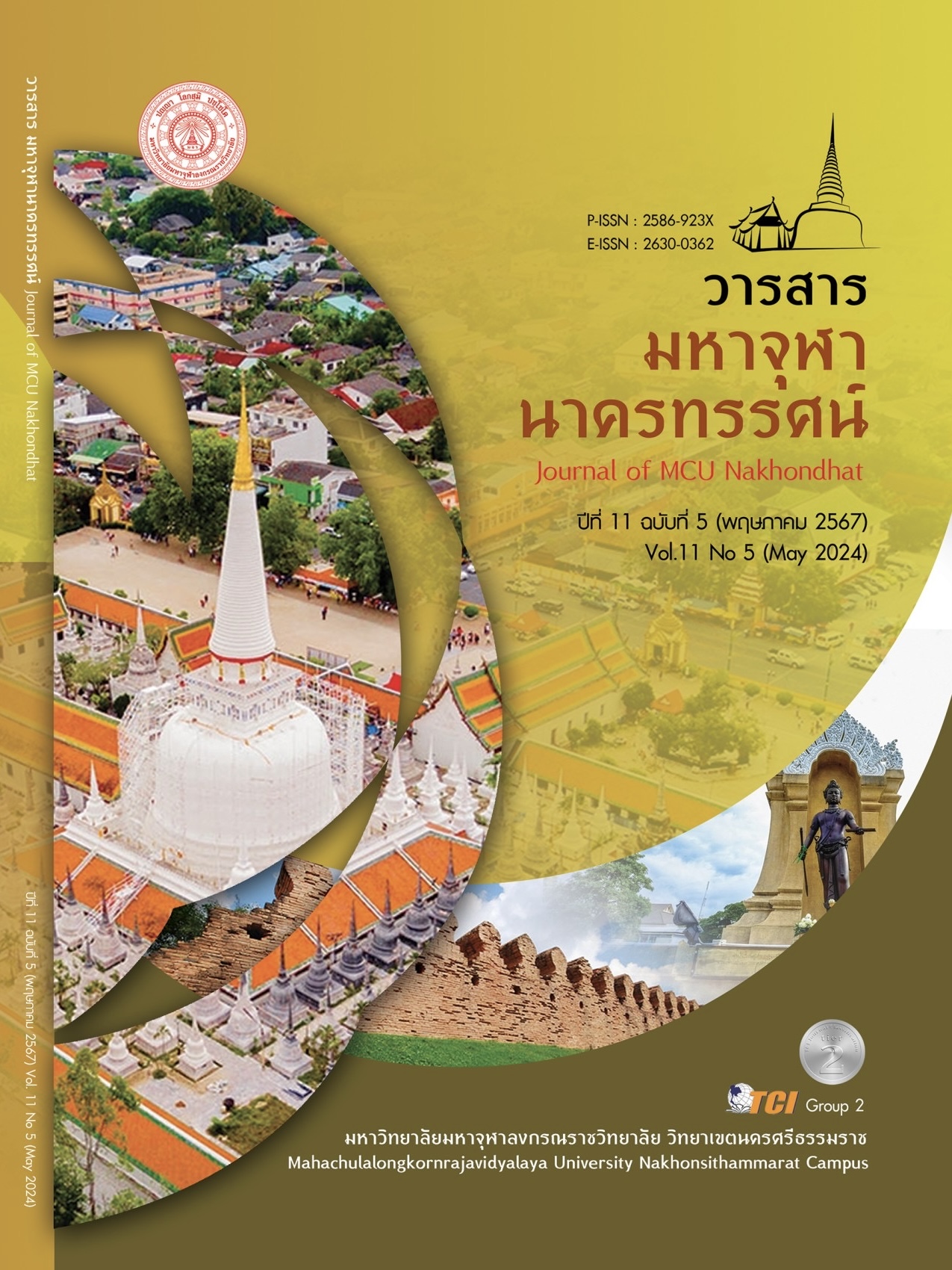SPIRITUAL LEADERSHIP JOB SATISFACTION AND JOB PERFORMANCE OF COMMUNITY RELATIONS POLICE UNDER METROPOLITAN POLICE DIVISION 1-9
Main Article Content
Abstract
The purposes of this study were (1) to study the level of spiritual leadership, job satisfaction, job performance of community relations police under metropolitan police division 1-9, (2) to study the influence of spiritual leadership, job satisfaction, job performance of community relations police under metropolitan police division 1-9, (3) to study the indirect effect of spiritual leadership, mediating job satisfaction toward job performance of community relations police under metropolitan police division 1-9. This research was quantitative research. The samples of this study were 264 community relations police officers under metropolitan police division 1-9, selected by simple random sampling. The research instrument was 6 rating scale questionnaires. The statistics were mean, standard deviation and correlation coefficient. The structural equation modeling (SEM) and path analysis were applied. The research results indicated that the level of spiritual leadership, job satisfaction, job performance of community relations police under metropolitan police division 1-9 were high. Spiritual leadership had the significantly positive effects on job performance of community relations police under metropolitan police division 1-9. Job satisfaction had the significantly positive effects on job performance of community relations police under metropolitan police division 1-9. Spiritual leadership had the significantly positive indirect effect through job satisfaction on job performance of community relations police under metropolitan police division 1-9. The findings had found that job satisfaction had been a good mediator variable. Spiritual leadership had indirect effect through job satisfaction on job performance. Thus, the ways how to increase job performance of employee were enhancing job satisfaction of employee.
Article Details

This work is licensed under a Creative Commons Attribution-NonCommercial-NoDerivatives 4.0 International License.
References
ลัดดา จุลวงศ์และศักดิ์ชัย นิรัญทวี. (2363). การบริหารสถานศึกษาด้วยภาวะผู้นำเชิงจิตวิญญาณ. วารสารวิชาการและวิจัยสังคมศาสตร์, 15(1), 17–30.
วิษณุ นวนมุสิด. (2562). การปฏิบัติหน้าที่ของตำรวจชุมชนสัมพันธ์ในการป้องกันและแก้ไขปัญหาอาชญากรรม: กรณีศึกษากองบัญชาการตำรวจนครบาล. กรุงเทพมหานคร: มหาวิทยาลัยรามคำแหง.
สำนักงานตำรวจแห่งชาติ. (2566). แนวทางการปฏิบัติงานตามนโยบายการบริหารราชการสำนักงานตำรวจแห่งชาติ ประจำปีงบประมาณ พ.ศ.2567. เรียกใช้เมื่อ 10 ธันวาคม 2566 จาก http://www. royalthaipolice.go.th/
Aamodt, M., G. (1996). Applied Industrial/Organizational Psychology (4th edition.). Oxford: Brooks/Cole.
Azmy, A. et al. (2023). The influence of transformational leadership and organizational culture on employee performance at PT. Retrieved December 10, 2023, from https://doi.org/10.2991/978-94-6463-244
Chen, C.-Y., & Yang, C.-F. (2012). The impact of spiritual leadership on organizational citizenship behavior: A multi-sample analysis. Retrieved December 10, 2023, from http://doi:10.1007/s10551-011-0953-3
Conger, J. A., & Kanungo, R. N. (1998). Charismatic leadership in organizations. SAGE Publications, 1(5), 56-79.
Dalal, R. S. et al. (2012). The relative importance of employee engagement, other job attitudes, and trait affect as predictors of job performance. Journal of Applied Social Psychology, 42(S1), E295-E325.
Fry, L. W. (2003). Toward a theory of spiritual leadership. Leadership Quarterly, 14(6), 693–727.
Fry, L. W., & Matherly, L. (2006). Spiritual leadership and organizational performance. Paper Presented at the Academy of Management. Atlanta: Georgia.
George, J., & Jones, G. (2002). Understanding and managing organizational behavior. Atlanta: Addison-Wesley.
Kawiana, I. G. P., & Riana, I. G. (2016). The Mediating Effect of Calling on Spiritual Leadership and Job Satisfaction in Village Credit Institution. Scientific Journal of PPI - UKM, 3(6), 276-282.
Koesmono, H. T. (2005). Pengaruh Budaya Organisasi Terhadap Motivasi dan Kepuasan Kerja Serta Kinerja Karyawan Pada Sub Sektor Industri Pengolahan Kayu Skala Menengah Di JawaTimur. Jurnal Manajemen & Kewirausahaan, 7(2), 171-188.
Koustelios, A. & Bagiatis, K. (1997). The employee satisfaction inventory (ESI): development of a scale to measure satisfaction of Greek employees. Educational & Psychological Measurement, 3(8), 469-476.
Manel, D. R. et al. (2023). Analyzing the effect of organizational commitment, spiritual motivation and spiritual leadership on employee performance through job satisfaction. International Journal of Finance. Economics and Business, 2(1), 34-43.
Musta’in, M. M. et al. (2014). A study on employees performance: Spiritual leadership and work motivation with mediation work satisfaction at the university of Darul Ulum, Indonesia. European Journal of Business and Management, 6(39), 77-86.
Pio, R. J. (2022). The mediation effect of quality of worklife and job satisfaction in the relationship between spiritual leadership to employee performance. International Journal of Law and Management, 64(1), 1-17.
Pio, R. J. et al. (2018). The influence of spiritual leadership on quality of work life, job satisfaction and organizational citizenship behavior. International Journal of Law and Management, 60(2), 35-48.
Rotundo, M., & Sackett, P. R. (2002). The relative importance of task, citizenship, and counterproductive performance to global ratings of job performance: A policy-capturing approach. Journal of Applied Psychology, 87(1), 66–80.
Sackett, P. R., & Lievens, F. (2008). Personnel selection. Annual Review of Psychology, 59(2008),419-450.
Sani, A. et al. (2016). The effect of spiritual leadership on workplace spirituality, job satisfaction and Ihsan behaviour (a study on nurses of Aisyiah Islamic Hospital in Malang, Indonesia). International Journal of Applied Business and Economic Research, 14(11), 7675-7688.
Smith, P. C. et al. (1969). The measurement of satisfaction in work and retirement. Amsterdam: Rand McNally.
Spector, P. E. (2008). Industrial and organizational psychology. Wiley Research and Practice, 5(2008), 55-67.
Vakola, M., & Nicholaou, I. (2012). Organizational psychology & behaviour. Oxford: Rosili.
Veechio, R. P. (2000). Organizational behavior : Core concepts. LA: Dryden Press.
Weiss, R. V et al. (1976). Manual for the Minnesota Satisfaction Questionnaire. Minneapolis: Industrial Relations Center, University of Minnesota. Minnesota: University of Minnesota.
Yousef, A. D. (1998). Satisfaction With Job Security as a Predictor of Organizational Commitment and Job Performance in a Multicultural Environment. International Journal of Manpower, 19(3), 187-194.


